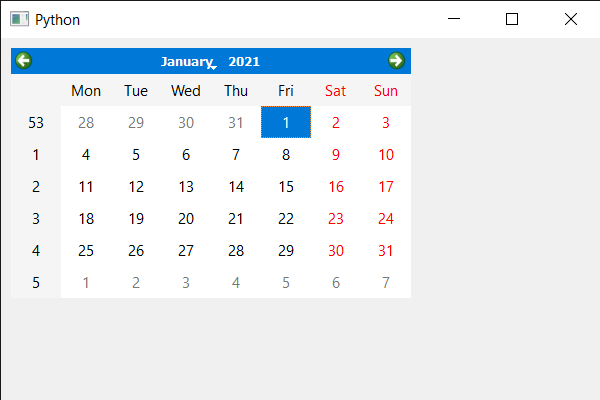En este artículo veremos cómo podemos actualizar el QCalendarWidget. Actualizar significa reflejar cualquier cambio que haya ocurrido en el back-end de la pantalla. La actualización no tiene efecto si está desactivada.
Para hacer esto, usaremos
updateel método con el objeto QCalendarWidget.Sintaxis: calendario.actualizar()
Argumento: no requiere argumento
Retorno : Devuelve Ninguno
A continuación se muestra la implementación.
Python3
# importing libraries
from PyQt5.QtWidgets import *
from PyQt5 import QtCore, QtGui
from PyQt5.QtGui import *
from PyQt5.QtCore import *
import sys
class Window(QMainWindow):
def __init__(self):
super().__init__()
# setting title
self.setWindowTitle("Python ")
# setting geometry
self.setGeometry(100, 100, 600, 400)
# calling method
self.UiComponents()
# showing all the widgets
self.show()
# method for components
def UiComponents(self):
# creating a QCalendarWidget object
calender = QCalendarWidget(self)
# setting geometry to the calendar
calender.setGeometry(10, 10, 400, 250)
# setting selected date
calender.setSelectedDate(QDate(2021, 1, 1))
# updating the calendar
calender.update()
# create pyqt5 app
App = QApplication(sys.argv)
# create the instance of our Window
window = Window()
# start the app
sys.exit(App.exec())
Producción :
Publicación traducida automáticamente
Artículo escrito por rakshitarora y traducido por Barcelona Geeks. The original can be accessed here. Licence: CCBY-SA